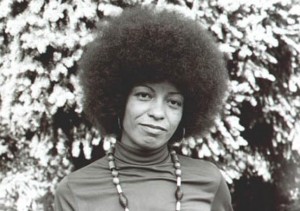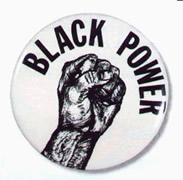Recent weeks I’ve attempted to lay out an intellectual history of African American thought since the late 1960s, leading up to the concurrent Ages of Obama and Ferguson. While today’s post is a slight detour from that, my thoughts today about the relationship between intellectual history and Black Power history add to greater thinking about how we as intellectual historians should not hesitate to ask new questions when thinking about African American, or for that matter American, intellectual history. Indeed, my experience at South Carolina’s Media and Civil Rights History Symposium will inform my own work for years to come.
The University of South Carolina has hosted the Media and Civil Rights History Symposium in 2011, 2013, and 2015. I’ve had the good fortune to both attend and give papers at the two most recent versions of this conference. Not surprisingly, there’s a rich subfield of humanities scholarship growing examining the relationship between the American media and the Civil Rights Movement. With this year’s theme examining Black Power, it’s not surprising that more is being done on both the Civil Rights and Black Power eras and the media framing of both. Of course, works such as Jane Rhodes’ Framing the Black Panthers (2007) and Aniko Bodroghkozy’s Equal Time: Television and the Civil Rights Movement (2012), along with older monographs such as Todd Gitlin’s The Whole World is Watching: Mass Media in the Making and Unmaking of the New Left (1980), have proven the importance of media to both how Americans understood the Civil Rights and Black Power Movements as they experienced them, along with how such framing informed American memory of those movements years and decades afterward.
The conference provided a chance to listen to some great papers, along with interacting with Peniel Joseph, architect of Black Power Studies and a key historian in the larger field of African American history. The last few days have offered me a chance to take stock of both Civil Rights and Black Power historiography, and where both fields can  go. Also, being exposed to scholars from history, journalism, and media studies has also given me more to consider in terms of what we as intellectual historians can borrow from other fields of scholarly inquiry. In a future post I’ll say more about journalism history and intellectual history. Allison Perlman’s work has dealt with this relationship in a sophisticated and well-reasoned manner; I can only add a little to it, which I will down the road.
go. Also, being exposed to scholars from history, journalism, and media studies has also given me more to consider in terms of what we as intellectual historians can borrow from other fields of scholarly inquiry. In a future post I’ll say more about journalism history and intellectual history. Allison Perlman’s work has dealt with this relationship in a sophisticated and well-reasoned manner; I can only add a little to it, which I will down the road.
First, starting off with where we can go with Black Power and Civil Rights scholarship, local case studies provide us a chance to do serious work understanding the relationship between local movements and national contexts. I argue that a work that best illustrates this is Devin Fergus’ Liberalism, Black Power, and the Making of American Politics, 1965-1980 (2009). Fergus looks at Black Power in the state of North Carolina and connects it to southern liberalism, the rise of the Republican Party in the Deep South, and the continued campaign of African Americans across the nation for greater political and economic power. The fact that the book is about Black Power in the southern United States is also a reminder that Black Power was always more than activists in Oakland, Chicago, and New York City, but a national campaign that took a variety of forms depending on what part of the country it operated in.
As intellectual historians, however, we should not shy away from wrestling with the legacy of Black Power on a national and international scale. One key facet of Black Power scholarship that still needs to be dealt with is the relationship between Black Power radicals and Black liberals. Now this is a bit tricky to do, partially because Black Power as an ideology never exclusively stayed on the Left. And there were considerable tensions between Black liberals and Black Power activists—a tension that still lives on today, as I wrote about last week. However, Black Power, an ideology that argued for African American self-determination, could be interpreted in a number of ways and appropriated by liberals, conservatives, and radicals alike. Exploring how Black liberals, most of whom were members of the Democratic Party, by the early 1970s worked with (and against) Black Power activists could offer much for intellectual historians to consider.
A few books have begun to tackle this question, along with the interactions between liberals on a national level and Black Power advocates. Karen Ferguson’s Top Down: The Ford Foundation, Black Power, and the Reinvention of Racial Liberalism (2013) offers a great example of the kind of work I’m referring to. Just as important is the memory of Black Power and Civil Rights Movements. The very recent release of Black America in the Shadow of the Sixties: Notes on the Civil Rights Movement, Neoliberalism, and Politics by Clarence Lang offers to considerable intellectual food for thought. Lang argues that “the persistence of the Sixties in our analytical and political framing highlights the need for formulations more closely aligned with our needs today in a context of neoliberalism.”[1]
In other words, Lang warns activists and intellectuals alike to think harder about the modern day context of activism. Thinking about the Sixties—and Seventies—is important, but for Lang properly understanding the context of movements in the past will help Americans today avoid trying to repeat the past in a different historical context. The legacy of Black Power will be with us for a long time, but understanding what that legacy bequeathed to American society will remain the task of Black Power scholars, and intellectual historians, for decades to come.
Allow me a few more words to briefly remark on a few anniversaries that have just come and gone. April 3 was the 150th anniversary of the fall of Richmond, Virginia, during the closing days of the American Civil War. April 4 was the 47th anniversary of the assassination of Martin Luther King, Jr. Normally I’d add some commentary here, but all I want to say at the end of a lengthy post is this: I can’t think of another two day period of anniversaries that say so much about the long, difficult, hazardous, and sometimes (but all too rarely) awe-inspiring history of race relations in American history.
[1] Clarence Lang, Black America in the Shadow of the Sixties: Notes on the Civil Rights Movement, Neoliberalism, and Politics. (Ann Arbor: University of Michigan Press, 2015), p. xi.

4 Thoughts on this Post
S-USIH Comment Policy
We ask that those who participate in the discussions generated in the Comments section do so with the same decorum as they would in any other academic setting or context. Since the USIH bloggers write under our real names, we would prefer that our commenters also identify themselves by their real name. As our primary goal is to stimulate and engage in fruitful and productive discussion, ad hominem attacks (personal or professional), unnecessary insults, and/or mean-spiritedness have no place in the USIH Blog’s Comments section. Therefore, we reserve the right to remove any comments that contain any of the above and/or are not intended to further the discussion of the topic of the post. We welcome suggestions for corrections to any of our posts. As the official blog of the Society of US Intellectual History, we hope to foster a diverse community of scholars and readers who engage with one another in discussions of US intellectual history, broadly understood.
Robert, I always get a buzz of excitement when I learn through FB that your post is up; what you’re doing with Black Power and its complicated relationship with Black liberalism is great! A figure that has always fascinated me in this regard is Bayard Rustin, who of course was not sympathetic with BP. One thing that I like a lot about Joseph’s biography on Carmichael is how he delineates the shifting connections b/w SNCC and more liberal movements, specially in the South (interestingly, an Amazon review of Black Against Empire criticizes it for not offering enough material on the South).
The international context, as you point out briefly, is essential to understand how these relations developed. Cuba’s proximity is a key element in this regard, there’s still much to be written about that side of the story. A recent article by Anne Garland Mahler does an excellent job at doing this by concentrating on the 1966 Tricontinental Conference. The title of the essay is The Global South in the Belly of the Beast: Viewing African American Civil Rights through a Tricontinental Lens, you can check it out through Project Muse (It would be great to know your impressions about it sometime!): http://muse.jhu.edu/login?auth=0&type=summary&url=/journals/latin_american_research_review/v050/50.1.mahler.html
First, thanks for the kind words! I’m always pleased to see when you respond to one of my posts, because (like today) you always have something crucial to add to the conversation.
As for the article you just posted, I’m definitely going to read it as soon as I can. It already looks like a fascinating read. Have you, by chance, read this interview with Adolph Reed? http://platypus1917.org/2015/04/04/unite-many-interview-adolph-l-reed-jr/ It seems to address some of the themes we’re both talking about in regards to the relationship between Black Power, the Left, and liberals.
I haven’t but I will definitely read it, thanks. His critique of Selma was trenchant, to say the least. Another 60s connection: at the moment I am trying to find an article by John Oliver Killens about Uncle Tom’s Cabin, which was published and translated in a journal in Cuba in 1964. The Black Cuban poet and scholar Roberto Friol wrote a critique of Oliver Killens’ own critique of UTC, with allusions to figures such as Richard Wright and Thomas Merton.
Has anything been written on Black Power in the American/US imagination, or in the imagination of US intellectuals (e.g. in the mode of Public Enemy’s ‘Fear of a Black Planet’)? And, given the concern in educational/sociological literature for black males and fear, anything in particular about gender and black power in the American imagination? – TL